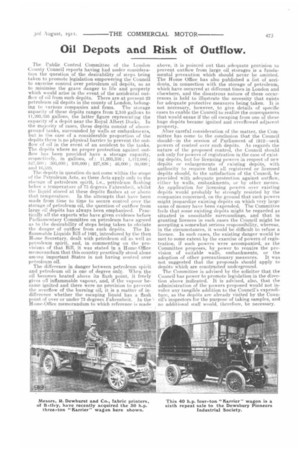Oil Depots and Risk of Outflow.
Page 19

If you've noticed an error in this article please click here to report it so we can fix it.
The Public Control Committee of the London County Council reports having had under consideration the question of the desirability of steps being taken to promote legislation empowering the Council to exercise control over petroleum oil depots, so as to tminimise the grave danger to life and property which would arise in the event of the accidental outflow of oil from such depOts. There are at present 23 petroleum oil depots in the county of London, belong ing to various companies and firms. The storage capacity of these depots ranges from 2,340 gallons to 11,203,336 gallons, the latter figure representing the capacity of a depOt near the Royal Albert Docks. In the majority of cases, these depots consist of aboveground tanks, surrounded by walls or embankments, but in the case of a considerable proportion of the depOts there is no physical barrier to prevent the outflow of oil in the event of an accident to the tanks. The depots where no proper protection against outflow has been provided have a storage capacity, respectively, in gallons, of : 11,203,336 ; 1412:086 ; 547J00; 303,000; 210,000; 227,836; 46,000 ; 36,000; and 10,500, The depots in question do not come within the scope of the Petroleum Acts, as these Acts apply only to the storage of petroleum spirit, i.e., petroleum flashing below a temperature of 73 degrees Fahrenheit, whilst the liquid stored at these depots flashes at or above that temperature. In the attempts that have been made from time to time to secure control over the storage of petroleum oil, the question of outflow from large oil depOts has always been emphasized. Practically all the experts who have given evidence before Parliamentary Committee on petroleum have agreed as to the desirability of steps being taken to obviate the danger of outflow from such depOts. The Inflammable Liquids Bill of 1891, introduced by the then Home Secretary, dealt with petroleum oil as well as petroleum spirit, and, in commenting on the provisions of that Bill, it was stated in a. Home-Office memorandum that this country practically stood alone among important States in not having control over petroleum oil.
The difference in danger between petroleum spirit and petroleum oil is one of degree only. When the oil becomes heated above its flash point, it freely gives off inflammable vapour, and, if the vapour became ignited and there were no provision to prevent the overflow of the burning oil, it is a matter of indifference whether the escaping liquid has a flash point of over or under 73 degrees Fahrenheit.. in the Home-Office memorandum to which reference is made
above, it is pointed out that adequate provision to prevent outflow from large oil storages is a fundamental precaution which should never be omitted. The Home Office has also published a list of accidents, in connection with the storage of petroleum, which have occurred at different times in London and elsewhere, and the disastrous nature of these occurrences is held to illustrate the necessity that exists for adequate protective measures being taken. It is not necessary, however, to give details of specific cases to enable the Council to realize the consequences that would ensue if the oil escaping from one of these huge depOts became ignited and overflowed adjacent property.
After careful consideration of the matter, the Committee has come to the conclusion that the Council should—in the session of Parliament of 1912—seek powers of control over such depots. As regards the nature of the proposed control, the Council should ask only for powers of registration in the case of existing depOts, but for licensing powers in respect of new depots. or enlargements of existing depots, with authority to require that all registered or licensed depots should, to the satisfaction of the Council, be provided with adequate protection against outflow, either by walls, embankments, or by other means. An application for licensing powers over existing depots would probably be strongly resisted by the companies concerned, on the ground that such powers might jeopardize existing depOts on which very large sums of money have been expended. The Committee feels that some existing depots might be regarded as situated in unsuitable surroundings, and that in granting licences in such cases the Council might be accepting a somewhat. serious responsibility, whereas, in the circumstances, it. would be difficult to refuse a licence. In such cases, the existing danger would be met to some extent by the exercise of powers of registration, if such powers were accompanied, as the Committee proposes, by power to require the provision of suitable walls, embankments, or the adoption of other precautionary measures. It was not suggested that the proposals should apply to depots which are constructed underground.
The Committee is advised by the solicitor that the Council has power to promote legislation in the direction above indicated. It is advised, also, that the administration of the powers proposed would not involve any tangible addition to the Council's expenditure, as the depOts are already visited by the Council's inspectors for the purpose of taking samples, and no additional staff would, therefore, be necessary.






















